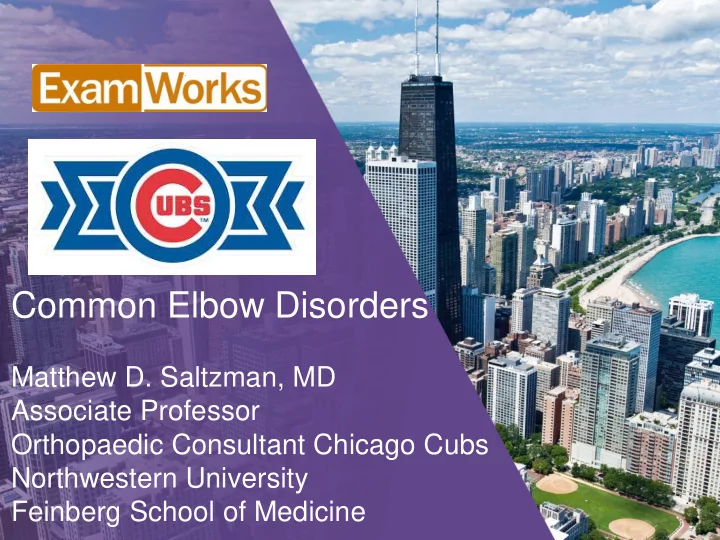

Common Elbow Disorders Matthew D. Saltzman, MD Associate Professor Orthopaedic Consultant Chicago Cubs Northwestern University Feinberg School of Medicine
Matthew D. Saltzman, MD Grew up in NW suburbs of Chicago University of Wisconsin-Madison Loyola University Medical School Northwestern University Orthopaedic Residency University of Washington Shoulder/Elbow Fellowship Board Certified American Board of Orthopaedic Surgery (ABOS) 2011
Chicago Cubs Orthopaedic Consultant • Game Coverage • Spring Training • Coordination of Treatment • Conduit to Trainers and GM → Unique perspective to treatment of orthopaedic conditions
2016
Sports Manager Treating Agent MD Front Office Athlete Second opinion MD Teammates
Work Adjustor Case Supervisor Manager Attorney WC Claimant IME MD Treating MD
Common Elbow Conditions • Lateral Epicondylitis (Tennis Elbow) • Medial Epicondylitis (Golfer’s Elbow) • Distal Biceps Tear • Elbow Fracture • Elbow Dislocation • Elbow Arthritis
Lateral Epicondylitis 1873: “lawn tennis arm”
Lateral Epicondylitis Epidemiology Carter, JBJS 1925 • Male = Female • 4 th or 5 th decade of life • Dominant extremity more common • Manual labor, repetitive tasks • 80% resolve in < 1 year • 4-11% require surgery
Physical Examination • Tenderness to Palpation just distal to lateral epicondyle • Pain with resisted wrist extension
Histologic Changes in Tendon Normal Tendon Angiofibroblastic Hyperplasia JBJS 1999
Non-surgical treatment • Rest • NSAIDs • Counter-Force Strap • Cock-up wrist splint • Physical Therapy
Cortisone • Early improvement (5 days-6 weeks) • Late same or worse (12 wks-12 months) • Skin atrophy, depigmentation
Cortisone • PRP ( n = 51) or corticosteroid (n = 49) • VAS scores: 49% improved in CSI vs. 73% in PRP group at 1 year ( p < 0.001) • CSI better initially, then declined • PRP group progressively improved
Surgery • Open or Arthroscopic
Audience Question What treatment is most frequently successful at resolving lateral epicondylitis? 1. Cortisone injection 2. PRP Injection 3. Physical Therapy 4. Arthroscopic surgery 5. Open surgery
Medial Epicondylitis • Less common • >90% respond to non-operative treatment
Distal Biceps Tear • Lifting heavy object • Eccentric contraction • “Pop” and subsequent bruising • Arm “looks funny” → reverse popeye deformity • Weakness (supination >flexion)
Distal Biceps Tear • Hook Test (O’Driscoll)
Distal Biceps Tear • MRI
Distal Biceps Tear • Repair • Tension Slide (Sethi)
Distal Biceps Tear
Audience Question What is the most common mechanism causing distal biceps rupture? 1. Muscle fatigue 2. Bench press exercise 3. Previous surgery 4. Eccentric contraction 5. Fall on outstretched hand
Elbow Fracture l
Elbow Fracture
Elbow Fracture l
Elbow Dislocation
Elbow Dislocation l
Elbow Dislocation l
Elbow Arthritis • Not as common as other joints • NSAIDs, ice, heat • Cortisone • Arthroscopic debridement
Elbow Arthritis • Total Elbow Arthroplasty • Lifetime 5 lb lifting restriction
Audience Question Who is the best candidate for total elbow arthroplasty? 1. 70 y/o retired female with rheumatoid arthritis 2. 30 y/o male soft ball coach 3. 50 y/o male mechanic 4. 60 y/o with displaced olecranon fracture 5. 80 y/o with severe congestive heart failure and persistent elbow clicking
What is MMI? • Known natural history: • Elbow strain (< 3 months) • Elbow fracture (4-6 months) • Elbow tendon repair ( 3-4 months) • Shoulder strain (<3 months) • Rotator cuff tear non-op (3 months) • Rotator cuff tear surgery (6 months) • Revision rotator cuff surgery (12 months) • Labrum repair surgery (4 months) • Shoulder replacement surgery (1 year)
Ok, let’s do an elbow exam!
Thank You Matthew D. Saltzman, MD Associate Professor Orthopaedic Consultant Chicago Cubs Northwestern University Feinberg School of Medicine
Recommend
More recommend